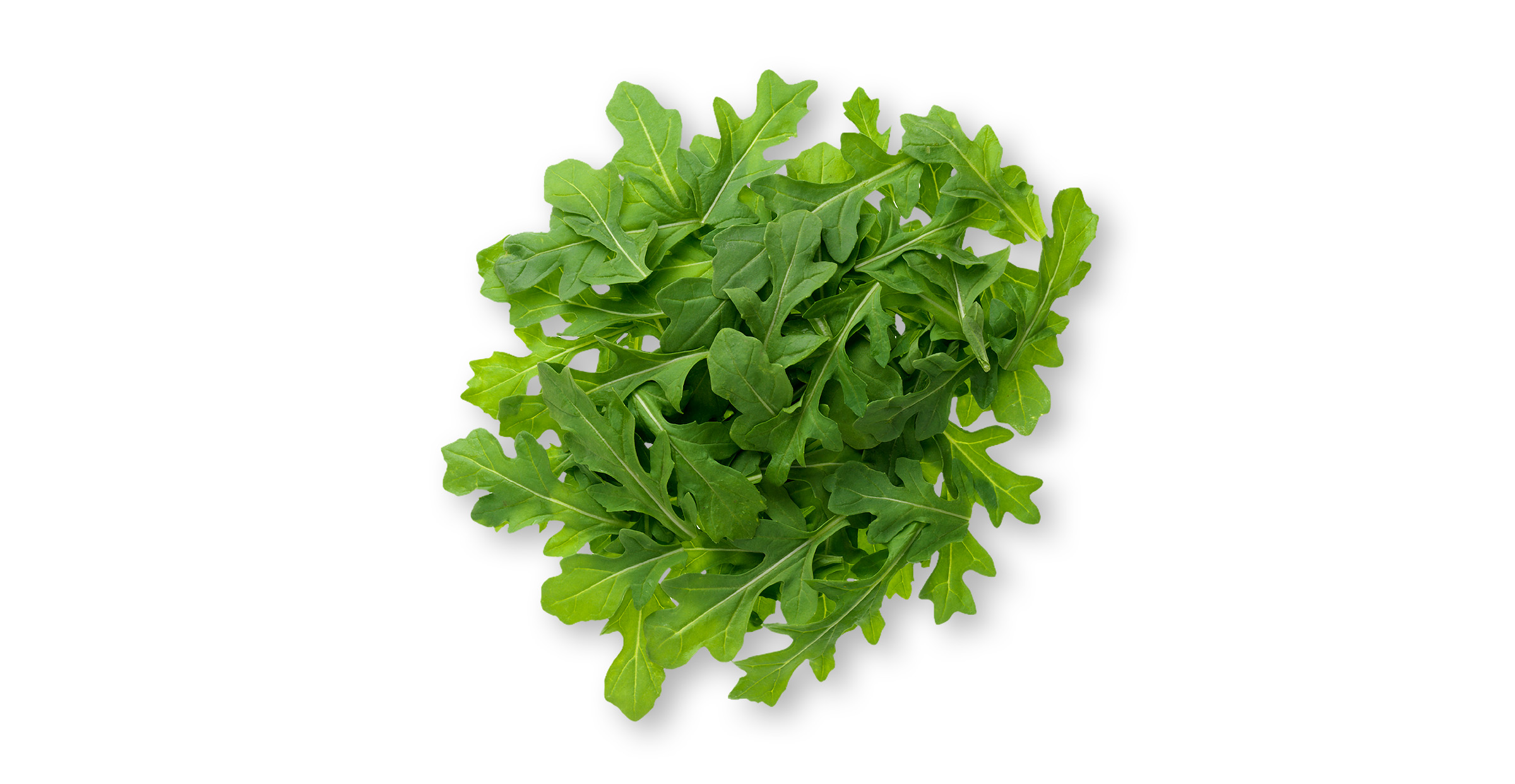Arugula Benefits and Nutrition Facts

What is arugula? Is arugula a lettuce?
Although arugula is a common leafy green/salad green it is not actually a lettuce. There is no such thing as arugula lettuce. The arugula plant, which is native to the mediterranean region, is part of the Brassicaceae family. It is closely related to broccoli, cauliflower and brussel sprouts. Arugula leaves are dark green with notches on both sides and rounded or pointed tips, similar to the shape of an oak leaf.
Compared to other leafy greens, there are relatively few acres of arugula grown in California and Arizona each year. However, it does seem to be growing in popularity. Registered Dietitian, Neva Cochran even believes that arugula may be the next “leafy darling” and begin to enjoy the same trendy status that kale has in recent years.
Arugula taste is mildly peppery and nutty. Some describe arugula taste as mustardy. This taste is definitely different compared to most other leafy greens and if it’s not one you enjoy, good arugula substitutes include baby spinach, endive and spring mix.
While typically called arugula in the U.S. you may have heard it called by some of its other common names from around the world. For example, in England, Australia and New Zealand arugula is commonly referred to as rocket or salad rocket.
Why is arugula good for you?
Arugula nutrition
Is arugula healthy? Yes! There are many health benefits of arugula. Like other dark leafy greens, arugula contains a large amount of vitamin K. Arugula provides 20 percent of the recommended daily intake of vitamin K. In the body vitamin K is responsible for normal blood clotting, improving calcium absorption and it even helps reduce the amount of calcium that leaves the body in the form of urine. This makes arugula a good addition to your diet for improving and maintaining bone strength.
Arugula benefits our bodies also by providing vitamin C. Vitamin C may help reduce the risk of developing heart disease and some cancers. In the body, vitamin C promotes a healthy immune system and acts as an antioxidant. Antioxidants fight off disease causing free radicals. A one-cup serving of arugula provides 4 percent of the daily recommended intake of vitamin C.

One serving of arugula also contains 4 percent of the daily allowance of folate. The folate in arugula may play a role in protecting from several types of cancer. When consumed by pregnant women, folate can lower the risk of birth defects in the baby’s brain and spine. Folate is also necessary for producing red blood cells and preventing anemia.
But the health benefits of Arugula don’t stop with these nutrients. Arugula also provides vitamin A, calcium, iron, potassium and magnesium. On top of all these nutritional benefits, arugula calories are minimal, with only five calories per one cup serving.
There could be possible arugula side effects for individuals who are on blood thinning medication. This is because arugula, like other dark leafy greens, is high in vitamin K, which can reverse the effects of anticoagulant drugs if suddenly increased in the body. However these people do not need to worry about side effects when consistent about how much arugula and other foods containing vitamin K they consume on a regular basis.
Can you eat raw arugula?
Arugula is most commonly eaten raw in salads or as a topping on other foods but it can be cooked. Sauteing is the most common method of cooking arugula.
If you want to make sure you are receiving the maximum nutrition benefits, studies show that it is better to eat arugula raw. This is because cooking arugula can slightly reduce its vitamin C, antioxidant, and mineral content. However, the nutritional difference between cooked and raw arugula is small, so it is best to eat it in whatever form you find most enjoyable.

So what is arugula good for? If you’re looking for creative ways to add arugula to your diet there’s plenty of options. Arugula is a great addition to salads, pastas, soups, sandwiches and omelets or as a tasty topping for pizzas and baked potatoes.
Which is better arugula or spinach?
In terms of nutritional value spinach is hard to beat. When comparing arugula vs. spinach nutrition the latter has higher concentrations of all vitamins and minerals per one cup serving.
However, arugula is still a very healthy option and if you enjoy it more than spinach then you shouldn’t get caught up in which one is better. Besides, for a well balanced diet dietitians recommend eating a variety of vegetables, not just the ones with the highest amounts of nutrients.
Can dogs eat arugula?
Short answer: yes! Arugula is not toxic to dogs and provides them with the same variety of vitamins, minerals, phytochemicals and antioxidants that it does humans. These nutrients essentially do the same for dogs that they do for us.
If you do plan to feed your dog arugula it is recommended by veterinarians that you slowly introduce it into their diet over time. Introducing large amounts of a new food to your dog at once may cause them digestive discomfort or make them sick. If you decide to give your dog arugula, introduce small amounts every other day and steam or chop it to increase its digestibility.
